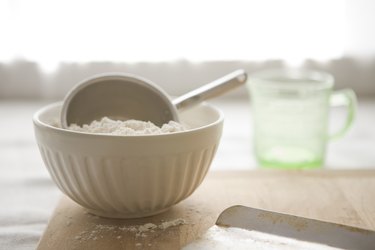
You can use cornstarch and all-purpose flour as thickeners in sauces, gravies, puddings and pies. Flour is also a common ingredient in baked goods.
Tip
Cornstarch and flour are both high-carbohydrate foods that are interchangeable in some recipes, but flour contains some nutrients that are not present in cornstarch.
Video of the Day
Calories
A 1-ounce serving of cornstarch contains 107 calories, a 1-ounce serving of white flour has 102 calories and each ounce of whole-wheat flour has 95 calories, according to the USDA Nutrient Database. Cornstarch and flour each have less than a gram of fat per 1-ounce serving.
Video of the Day
Consuming more calories than you expend can lead to weight gain, but the difference between the caloric contents of cornstarch and wheat flour is small. Your selection of cornstarch or flour when preparing your recipes is unlikely to have a significant effect on your weight.
Carbohydrates and Fiber
Cornstarch and flour are sugar-free. Dietary fiber is a heart-healthy carbohydrate in some plant foods, and the bran in whole grains, such as whole-wheat flour, is rich in fiber. A 1-ounce serving of cornstarch has 26 grams of total carbohydrates, including 0.3 grams of dietary fiber.
An ounce of white flour has 21 grams of carbohydrates and 0.8 grams of dietary fiber, and an ounce of whole-wheat flour has 20 grams of carbohydrates and 3 grams of dietary fiber.
Vitamins and Minerals
Whole grains, such as whole-wheat flour, are natural sources of magnesium, iron, selenium, thiamin and niacin. Refined grains, such as white flour, lose these natural nutrients during the refinement process.
The enrichment process includes replacing iron, niacin and thiamin. Enriched white flour also contains riboflavin and folic acid, which are not present in high amounts in whole-wheat flour. Cornstarch contains almost no essential vitamins or minerals.
Information on Gluten Intolerance
Gluten is a protein in wheat that can cause gas, bloating and diarrhea if you have celiac disease or are gluten-intolerant. Products that contain gluten include white and whole-grain wheat flour, baked goods containing wheat flour and flour-thickened products, such as some gravies, sauces and custards.
The only way to prevent symptoms if you have gluten intolerance is to avoid consuming products with gluten. If you are allergic to wheat or have a gluten intolerance, you will want to choose cornstarch instead of flour as a thickener.
Was this article helpful?
150 Characters Max
0/150
Thank you for sharing!
Thank you for your feedback!